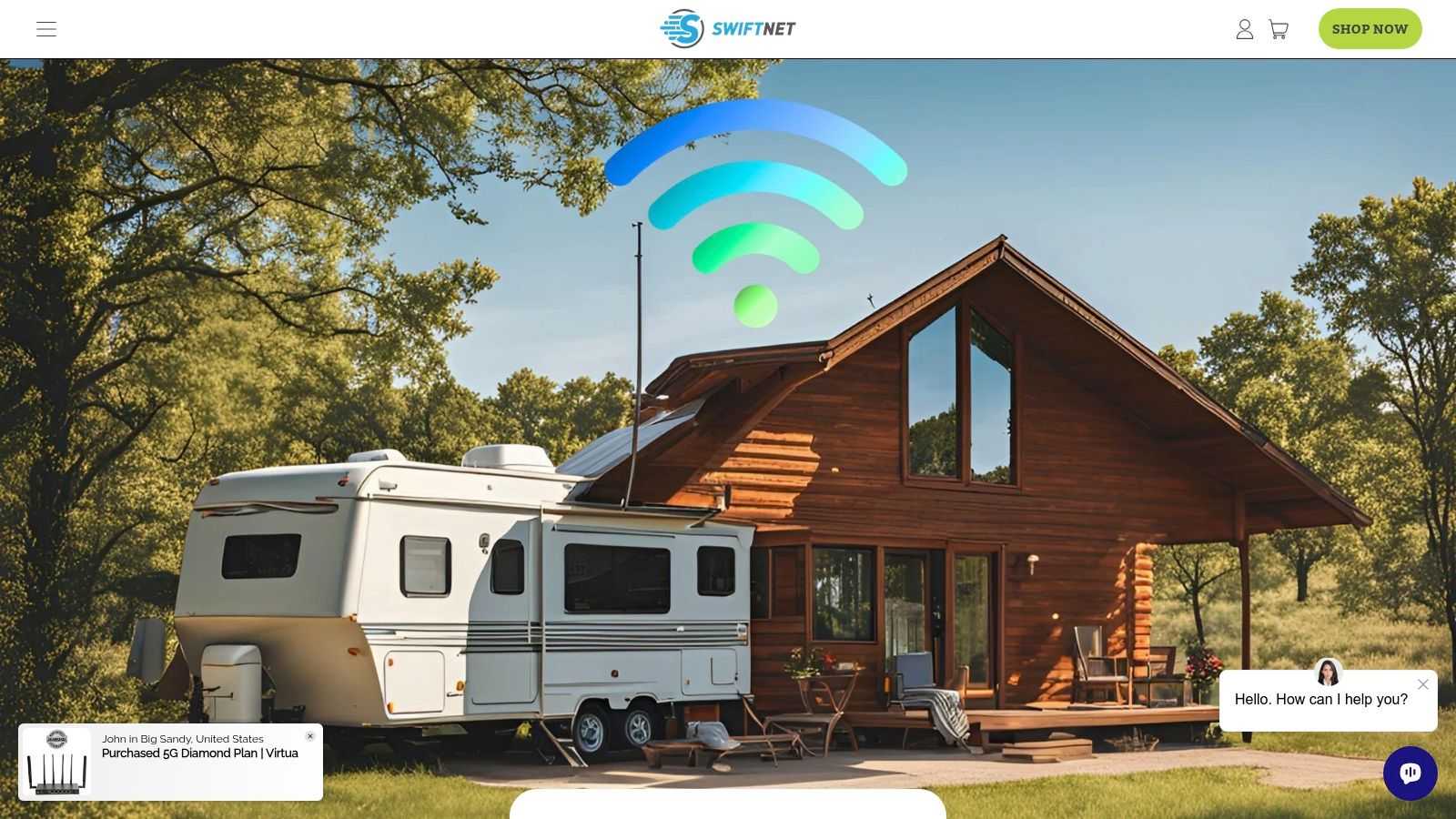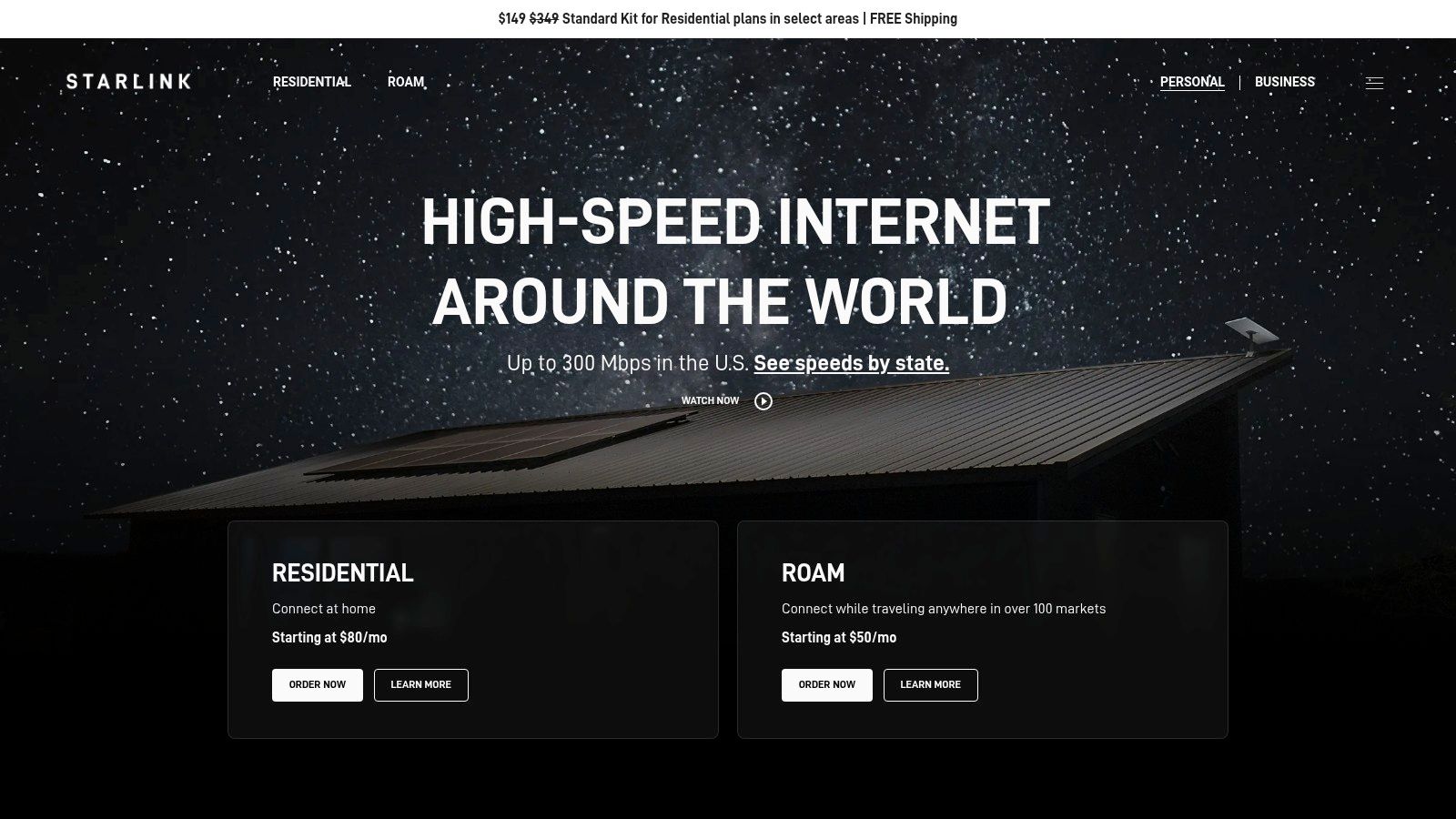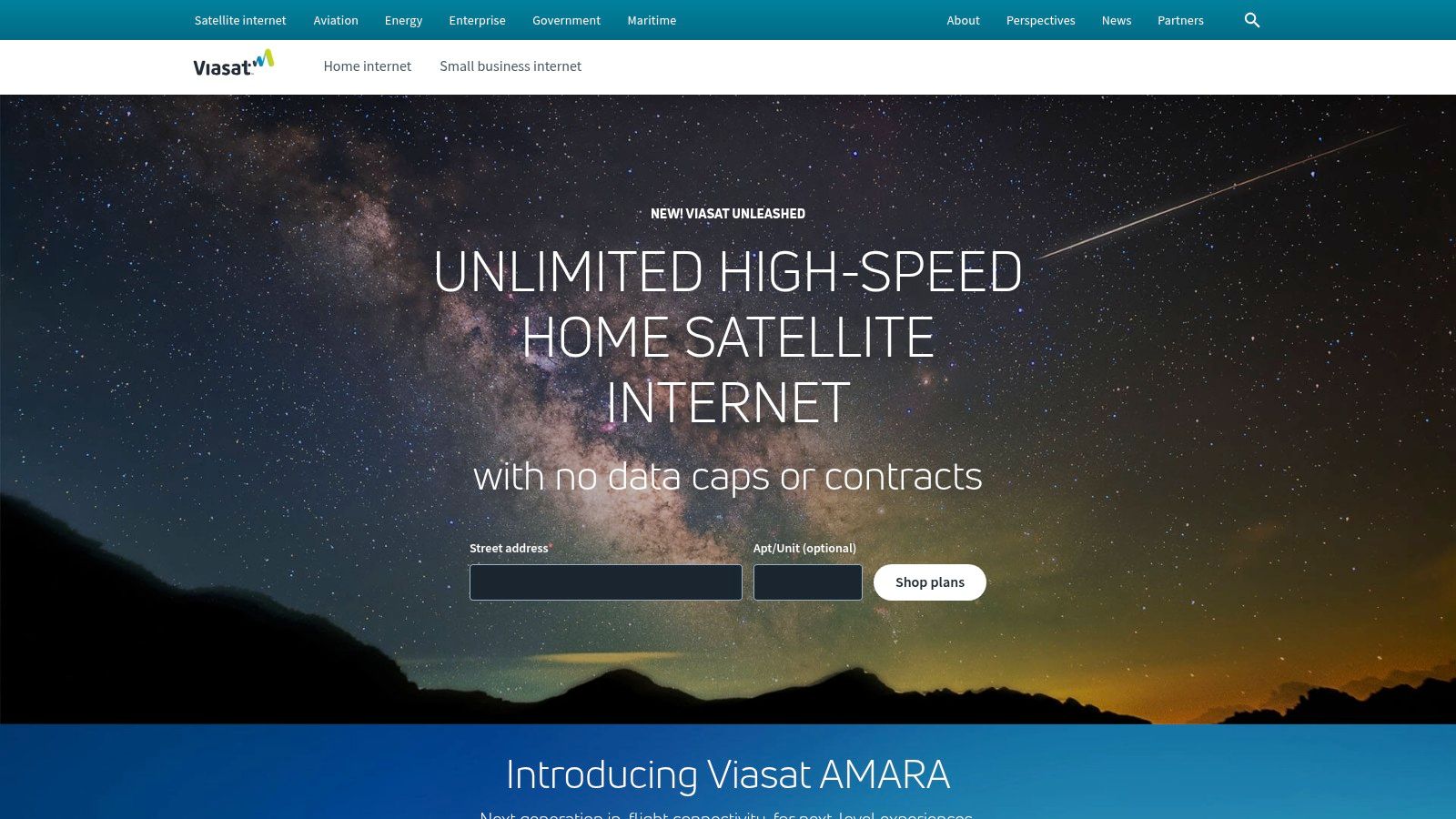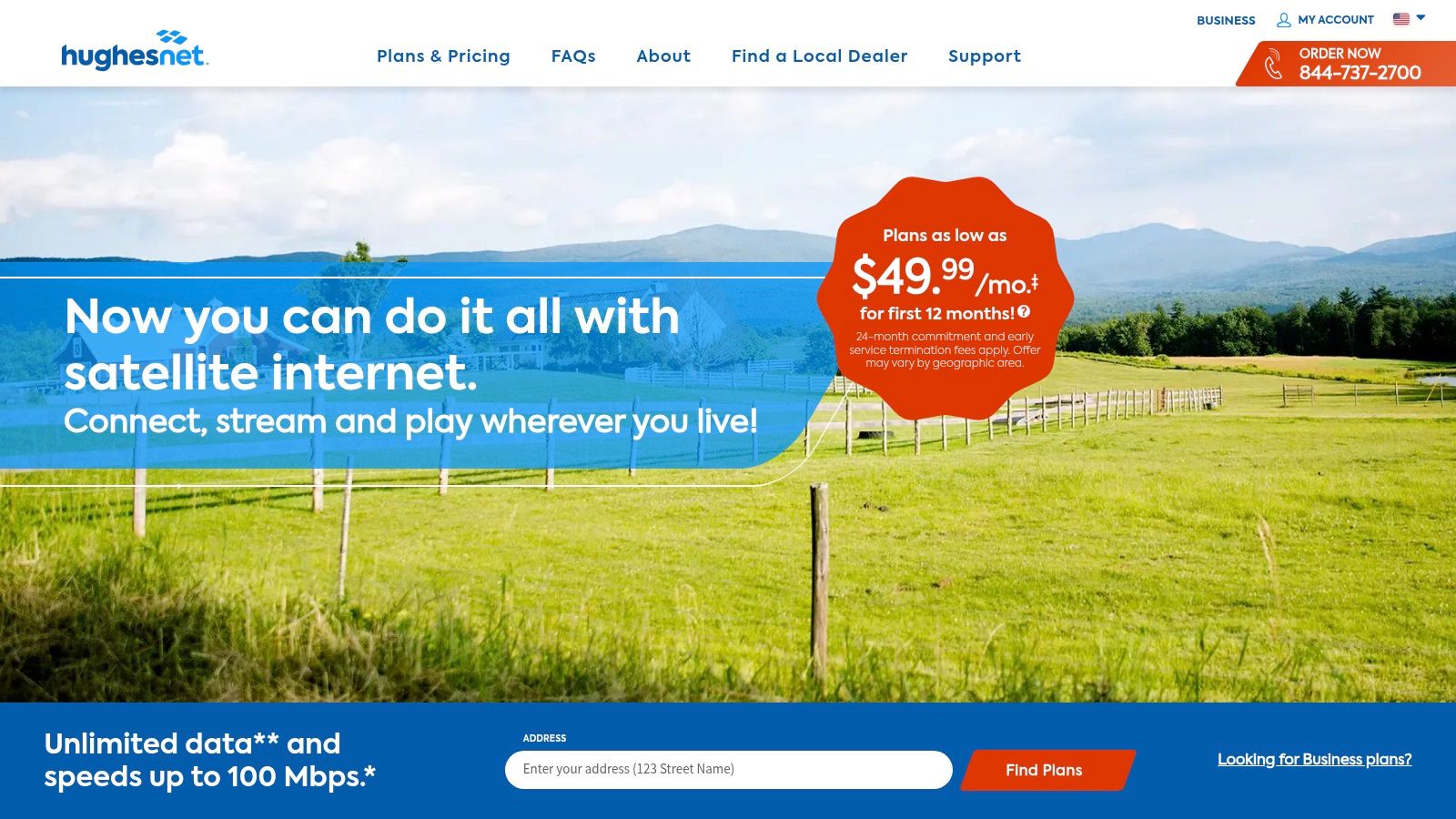
Find the Best Rural Wifi – Fast & Reliable
Posted by James on
Connecting the Countryside: Your Guide to the Best Rural Wifi
Struggling with slow or unreliable internet in a rural area? This guide reveals the 7 best rural wifi solutions for 2025, perfect for RV living, remote work, or simply staying connected. Discover which option best suits your needs, from established providers like Viasat and HughesNet to newer options like Starlink and T-Mobile Home Internet. We'll also delve into why SwiftNet Wifi delivers exceptional performance and reliability where other rural internet options fall short, making it a leading choice for the best rural wifi experience. Let's get connected!
1. SwiftNet Wifi
SwiftNet Wifi offers a compelling solution for those seeking reliable high-speed internet in rural areas and on the open road. Designed specifically for users outside the reach of traditional fiber optic networks, such as RV travelers, rural residents, and remote workers, SwiftNet Wifi leverages the power of 5G to deliver fast and consistent connectivity. This makes it a strong contender for the best rural wifi option, especially for those who value mobility and consistent performance.

While other providers may offer satellite internet or limited 4G plans, SwiftNet Wifi's focus on 5G technology allows for significantly faster speeds and lower latency. This means smoother streaming, faster downloads, and a more stable connection for video conferencing, online gaming, and other demanding online activities. Whether you're working remotely from your RV, streaming movies in a rural cabin, or simply need a reliable connection for everyday tasks, SwiftNet Wifi aims to provide the performance you need.
Unfortunately, specific details regarding pricing, data plans, and technical requirements are not readily available on the SwiftNet Wifi website. For detailed information about available plans, coverage in your area, and equipment needed, it's recommended to contact SwiftNet Wifi directly. This personalized approach allows them to tailor a solution to your specific needs and location. Implementation and setup will likely depend on the chosen plan and hardware, but contacting their sales team will clarify the process. Given their focus on rural customers and RV travelers, it's reasonable to expect a streamlined setup process designed for non-technical users.
SwiftNet Wifi prioritizes customer service and aims to provide customized solutions for those often overlooked by larger internet providers. While comparing specific features with competitors is difficult due to limited publicly available data, SwiftNet Wifi's emphasis on 5G technology and dedicated service for rural customers sets it apart. Instead of settling for unreliable or slow connections, SwiftNet Wifi strives to empower users with the connectivity they need to live and work effectively, regardless of their location. For those tired of searching for "best rural wifi" and coming up short, SwiftNet Wifi presents itself as a viable option worthy of consideration.
2. Starlink: Best Rural Wifi for High-Speed Connectivity
Starlink, SpaceX's satellite internet service, offers a compelling solution for those seeking reliable high-speed internet in rural and remote areas. Unlike traditional satellite internet plagued by high latency, Starlink utilizes a network of low Earth orbit satellites to deliver significantly faster speeds and lower latency, making it a viable option for activities like video conferencing, online gaming, and streaming. This makes it a top contender for the best rural wifi currently available. For those struggling with limited connectivity options, Starlink offers a real opportunity to bridge the digital divide.

With download speeds typically ranging from 100-200 Mbps in most locations and latency as low as 20-40ms (a stark contrast to the 600+ ms experienced with traditional satellite internet), Starlink provides a performance level previously unimaginable in many rural locations. This makes it an ideal solution for RV travelers, RV owners, people living in rural areas without fiber optic internet, remote workers, and online travelers who need consistent, high-quality internet access. The absence of data caps on most plans further enhances its appeal for high-bandwidth users. The self-install equipment, including a dish, router, and mounting hardware, simplifies the setup process. Portable options are also available, specifically catering to the needs of RV and mobile users, allowing them to stay connected on the go. You can learn more about Starlink.
While other satellite internet providers exist, Starlink's performance sets it apart. While we always encourage consumers to research all available options, many find that other providers simply can't match the speed and low latency crucial for modern internet usage. This focus on performance is why Starlink earns its spot on our list of the best rural wifi options.
Technical Requirements and Pricing:
Starlink requires a clear view of the sky for optimal performance. The upfront equipment cost is $599 for the standard hardware, and the monthly service fee is relatively expensive, ranging from $110-$120/month for residential service.
Pros:
- Availability: Accessible virtually anywhere with an unobstructed view of the sky.
- Superior Speed: Considerably faster than traditional satellite internet services.
- Contract-Free: No contracts are required, providing flexibility for users.
- Continuous Improvement: The service is constantly improving as SpaceX continues to launch more satellites.
Cons:
- High Upfront Cost: The initial hardware investment can be a barrier for some.
- Monthly Expense: The monthly service fee is higher than some other options, although the performance often justifies the cost.
- Weather Sensitivity: Severe weather can occasionally disrupt service.
- Line of Sight Requirement: An unobstructed view of the sky is essential for reliable connectivity.
Implementation Tip: Use the Starlink app to find the best placement for your dish to ensure an optimal connection. This helps maximize performance and minimize potential disruptions.
Starlink provides a compelling option for best rural wifi, especially for those prioritizing speed and low latency. While the cost might be higher than some alternatives, the performance benefits make it a worthwhile investment for many seeking a reliable and fast internet connection in rural locations. Visit the Starlink website for more details.
3. Viasat
Viasat emerges as a prominent player in the satellite internet arena, catering specifically to the needs of those in rural areas underserved by traditional cable and fiber connections. This makes it a viable option for RV travelers, rural homeowners, and remote workers seeking reliable internet access across the U.S. Leveraging geostationary satellites, Viasat boasts nationwide coverage and offers a variety of data plans designed to accommodate different usage patterns. Their newer satellite technology delivers noticeably improved speeds compared to older satellite internet systems, making it a contender for the title of "best rural wifi." This is especially important for those looking to maintain productivity while working remotely or enjoying streaming entertainment in their RVs.

Viasat offers download speeds reaching up to 100 Mbps in select areas, a significant advantage for rural users. They provide a range of data plans, from 40GB to 300GB per month, allowing users to choose a plan that aligns with their specific needs. For those requiring heavier data usage, unlimited data plans are available with priority data allowances. This ensures a consistent level of speed and performance for critical tasks, even during peak usage times. The included professional installation and built-in WiFi router simplify the setup process, a valuable perk for non-technical users. Furthermore, Viasat offers bundling options with DIRECTV, creating a convenient package for those seeking both internet and entertainment services. Learn more about Viasat. While some competitors may offer similar satellite-based solutions, it's crucial to carefully evaluate the total package, including customer support and data prioritization, factors where providers like SwiftNet strive to excel.
While Viasat presents a compelling option for best rural wifi, it's important to be aware of its limitations. Like all satellite internet services, Viasat experiences higher latency (around 600ms or more) than terrestrial options like cable and fiber. This latency can impact activities sensitive to real-time interaction, such as online gaming and video conferencing. Another factor to consider is the price increase after the promotional period ends, which can be substantial. Additionally, Viasat typically requires 2-year contracts, which may not suit all users. Finally, weather conditions can occasionally disrupt satellite signals, leading to temporary service interruptions. These factors should be carefully weighed against the benefits of having reliable internet access in rural locations where other options are limited. For those seeking alternative solutions or perhaps more flexible plans, researching providers like SwiftNet may be beneficial, especially regarding prioritized data and customer service.
4. T-Mobile Home Internet
For those seeking the best rural wifi, T-Mobile Home Internet presents a compelling option, especially for those living in areas without fiber optic internet and seeking a contract-free alternative. Leveraging T-Mobile's 4G LTE and 5G cellular networks, this fixed wireless solution brings internet connectivity to eligible rural and suburban locations, making it a viable choice for RV travelers, RV owners, remote workers, and anyone struggling with limited internet access in the countryside.
This service stands out for its simplicity and transparent pricing. For a flat rate of $50/month with autopay, you get unlimited data, eliminating concerns about data caps or throttling – a crucial advantage for those working remotely or relying heavily on internet access. This predictable cost makes budgeting easier, unlike some competitors who may surprise you with hidden fees or escalating prices after an introductory period.
Setting up T-Mobile Home Internet is a breeze. The self-install gateway effortlessly converts the T-Mobile cellular signal into Wi-Fi, eliminating the need for a technician visit and allowing you to get online quickly. This simple setup makes it incredibly convenient for RV travelers who frequently change locations and need internet access on the go.
Features and Benefits:
- Typical download speeds of 35-115 Mbps: While not as fast as fiber or cable in optimal conditions, these speeds are generally sufficient for everyday tasks like browsing, streaming, and video conferencing. This makes it a practical solution for those working online remotely in rural areas where other high-speed options may not be available.
- Unlimited data with no caps or throttling: A significant benefit for heavy internet users, ensuring consistent performance regardless of data consumption. This sets it apart from some rural internet providers who may impose limitations on data usage.
- Simple flat-rate pricing ($50/month with autopay): Transparent and predictable pricing simplifies budgeting.
- Self-install gateway: Easy setup without the wait for a professional installation. This plug-and-play convenience is especially beneficial for RV owners.
- No annual contracts or equipment fees: Offering flexibility and eliminating long-term commitments.
Pros:
- Affordable fixed monthly rate
- No equipment costs or hidden fees
- Simple setup with no professional installation needed
- Truly unlimited data with no throttling
Cons:
- Availability limited to areas with good T-Mobile coverage. This is a crucial consideration for those in the most remote rural locations.
- Speeds and performance can vary based on tower congestion.
- Not as fast as fiber or cable in optimal conditions. However, for many rural users, this is a significant upgrade over limited DSL or satellite internet options.
Why T-Mobile Home Internet Deserves a Spot on this List:
T-Mobile Home Internet earns its place as a top contender for best rural wifi because it addresses the critical needs of those living outside major metropolitan areas: affordable access to reliable, unlimited data. While other providers may offer comparable speeds in urban areas, T-Mobile's commitment to expanding its fixed wireless service into rural communities fills a crucial gap. This service prioritizes simplicity and affordability, making it an excellent option for those seeking a hassle-free internet solution without the constraints of traditional contracts and data caps. For RV travelers and rural residents seeking an alternative to less reliable or expensive options, T-Mobile Home Internet provides a viable path to staying connected.
5. HughesNet
For those seeking reliable internet access in the most remote corners of the United States, HughesNet is a frequently considered option. As one of the most established satellite internet providers, HughesNet blankets the country, reaching all 50 states with its geostationary satellite technology. This widespread availability makes it a popular choice for RV travelers, rural homeowners, and remote workers seeking best rural wifi solutions where terrestrial options are limited or nonexistent. This consistent coverage, regardless of location, is a key reason for its inclusion on this list. HughesNet offers several plans, all boasting consistent download speeds of 25 Mbps, differing primarily in their data allowances. Their Gen5 system represents an improvement over previous generations, offering enhanced performance for users.

HughesNet offers plans with data allowances ranging from 15GB to 75GB per month. A key feature is the "Bonus Zone," providing an additional 50GB of data during off-peak hours (2am-8am). This can be a significant advantage for users who can schedule larger downloads or uploads overnight. The service includes built-in Wi-Fi, simplifying setup, and professional installation is included in all plans, ensuring a hassle-free start for users less familiar with satellite internet technology. This is especially helpful for RV owners who may change locations frequently.
Pros:
- Availability: HughesNet's biggest strength lies in its near-universal availability across the U.S. As long as you have a clear view of the southern sky, you can likely get connected. This makes it invaluable for those in extremely rural locations and a viable option for RV travelers who need consistent internet access on the go.
- Consistent Speeds: The advertised 25 Mbps download speed is consistent across all plans, meaning users don't have to pay more for faster speeds.
- No Hard Data Caps: While speeds are reduced to 1-3 Mbps after exceeding your monthly data allowance, there are no hard data caps, meaning you can still access the internet, albeit at a slower speed.
- Equipment Options: You can choose to purchase your equipment outright or lease it, providing some flexibility depending on your budget and long-term plans.
Cons:
- High Latency: Satellite internet inherently suffers from higher latency (around 600ms or more). This lag can significantly impact activities sensitive to delays, such as online gaming and video calls.
- Cost Per GB: Compared to terrestrial options like fiber or cable, HughesNet is generally more expensive per gigabyte of data. This is an important factor to consider for heavy internet users.
- Contract Length and Fees: HughesNet typically requires 24-month contracts and charges early termination fees, which can be a significant drawback for those seeking short-term solutions.
- Peak Usage Degradation: While HughesNet advertises consistent speeds, performance can sometimes degrade during peak usage hours due to network congestion.
Website: https://www.hughesnet.com
While other satellite internet providers exist, HughesNet’s widespread availability and consistent 25 Mbps speeds make it a relevant choice for rural internet. Understanding its limitations, particularly regarding latency and cost per gigabyte, is crucial when comparing it to other options (if available). For users in truly remote areas where other options simply aren't feasible, HughesNet offers a connection to the digital world, making it a worthwhile consideration for best rural wifi, especially for those who prioritize consistent connectivity over speed and low latency.
6. Verizon LTE Home Internet
For those seeking reliable internet access in rural locations, Verizon LTE Home Internet presents a viable solution, leveraging Verizon's expansive 4G LTE network. This fixed wireless service is designed specifically for home internet use, offering higher data allowances and home-focused features compared to mobile hotspot devices. Its expanded reach now brings connectivity to more rural communities previously struggling with limited broadband options, making it a contender for the best rural wifi. This service is particularly well-suited for those living in rural areas, RV travelers, or remote workers seeking a stable connection outside of fiber optic availability.

Verizon LTE Home Internet distinguishes itself from traditional mobile hotspots by offering a dedicated home internet connection. Typical download speeds range from 25-50 Mbps, while upload speeds average between 3-10 Mbps. While some other rural internet providers may offer comparable speeds, the reliability of Verizon's established LTE network is a key advantage. The self-install router simplifies setup by converting the LTE signal to Wi-Fi, eliminating the need to wait for technicians. Most plans come with the benefit of no data caps, which is essential for those who rely heavily on the internet for work or entertainment. Additionally, integration with Verizon Home Phone service provides an optional bundle for those seeking a unified communication solution.
Setting up Verizon LTE Home Internet is designed to be user-friendly. The self-install router makes the process straightforward, allowing you to quickly establish a Wi-Fi network in your home or RV. Simply plug in the router, follow the on-screen instructions, and you’ll be online in minutes. This ease of installation is a significant advantage for those in remote areas who may face longer wait times for technician visits with other providers.
While Verizon LTE Home Internet offers a compelling solution for rural connectivity, considering its pros and cons is essential. The absence of annual contracts provides flexibility, while discounts for existing Verizon wireless customers offer additional value. The reliable performance based on Verizon's network is a significant plus. However, availability is contingent on Verizon network capacity in your specific location. It's also important to note that performance can fluctuate based on distance from cell towers and network congestion. The cost, while competitive, may be higher than some alternative rural options. While some competitors may offer alternative solutions, the reliability and performance consistency often associated with Verizon's network can be a deciding factor for those seeking uninterrupted connectivity in rural environments.
Finally, while Verizon does offer 5G Home Internet, its availability is primarily concentrated in more urban areas. For those in rural locations, LTE Home Internet remains the most viable option within the Verizon ecosystem.
For more information and to check availability in your area, visit the Verizon LTE Home Internet website: https://www.verizon.com/home/lte-home-internet
7. Rise Broadband
For those seeking reliable rural wifi, Rise Broadband emerges as a viable option, especially for users in the central and western United States. As one of America's largest fixed wireless internet service providers, Rise Broadband caters specifically to areas where other options like fiber optic cable are unavailable. This makes it a potential solution for RV travelers, RV owners, remote workers, and those living in rural areas without fiber internet access seeking the best rural wifi solution. Unlike satellite internet, which can be plagued by high latency, Rise Broadband utilizes a network of towers that communicate with an antenna installed at your home. This fixed wireless approach delivers significantly lower latency, making it suitable for activities like video conferencing and online gaming.
Rise Broadband offers a variety of plans with download speeds ranging from 15-50 Mbps in most service areas. This speed is sufficient for streaming, browsing, and working online, though it might not match the raw speed of fiber optic connections. The availability of both capped and unlimited data plans provides flexibility depending on your usage needs. The absence of hard throttling on unlimited plans is a major advantage, ensuring consistent speeds even during peak usage times. For those who bundle services, voice service options are also available. Professional installation of the receiver and antenna is included, which can be a relief for those less technically inclined. Plus, their focus on local customer service tailored to rural communities can be a welcome change from dealing with large, impersonal corporations. Learn more about Rise Broadband for additional details.
While Rise Broadband presents a compelling case for best rural wifi, it's important to consider both the pros and cons. One of the most significant advantages is the lower latency compared to satellite internet (typically 10-50ms). This results in a more responsive online experience. Monthly rates are also generally more affordable than many satellite internet options. The lack of contracts on certain plans offers additional flexibility. However, Rise Broadband's service requires a clear line-of-sight to a Rise Broadband tower. This can be a limiting factor depending on your location and surrounding terrain. Furthermore, their geographic availability, while expanding, is still more limited than satellite internet. Performance can also be affected by weather conditions, although generally less so than satellite connections. Finally, installation fees usually apply. Understanding these factors will help you decide if Rise Broadband is the right fit for your specific best rural wifi needs. If geographic limitations are a concern, exploring other options like SwiftNet may be beneficial for wider coverage and potentially faster speeds depending on the service area.
7-Point Rural WiFi Services Comparison
| Service | Core Features ✨ | Performance ★ | Pricing/Value 💰 | Audience 👥 |
|---|---|---|---|---|
| SwiftNet Wifi 🏆 | 5G high-speed; tailored for rural & RV | Reliable, fast coverage | Competitive pricing | Rural & RV travelers |
| Starlink | LEO satellite broadband; low latency | Rapid speeds; continuously improving | High upfront cost & ~$110+/mo | Rural, remote & RV users |
| Viasat | Geostationary service; varied data options | Consistent speeds; noticeable latency | Data caps; contract-based plans | U.S. rural communities |
| T-Mobile Home Internet | 4G LTE/5G; simple self-install | Variable speeds (35-115 Mbps) | $50 flat-rate; no contracts | Rural & suburban users |
| HughesNet | Gen5 satellite; fixed 25 Mbps speed | Steady performance; high latency impact | Expensive per GB; long-term contracts | Nationwide rural areas |
| Verizon LTE Home Internet | LTE fixed wireless; self-install router | Reliable LTE performance | Higher fees; discount options available | Rural & suburban, Verizon customers |
| Rise Broadband | Fixed wireless; low latency connectivity | Lower latency (10-50ms); stable | Affordable; flexible plan options | Rural & suburban communities |
Making the Right Connection: Choosing Your Best Rural Wifi
Finding reliable internet in rural areas can feel like searching for a needle in a haystack. This article explored several options for rural wifi, including Starlink, Viasat, T-Mobile Home Internet, HughesNet, Verizon LTE Home Internet, Rise Broadband, and SwiftNet Wifi. Each provider offers a unique blend of speed, data limits, and availability, making the decision-making process crucial. While some of these options may suffice, factors such as latency, data caps, and consistent speeds can significantly impact your online experience, especially for those working remotely or relying on the internet for entertainment. Remember that factors like location, budget, and data usage needs heavily influence which solution will be the "best rural wifi" for you.
For businesses operating in rural areas, a reliable internet connection is crucial for success in today's digital landscape. Developing a digital transformation roadmap is key to leveraging technology effectively. Source: Digital Transformation Roadmap: Unlock Growth from Webscope.io This underscores the importance of finding a dependable rural wifi solution that can support your business objectives. While several providers offer rural internet access, SwiftNet Wifi distinguishes itself through a commitment to providing high-speed, reliable connectivity tailored to the needs of rural communities. This focus makes it an excellent option for those who need consistent performance for work, streaming, or simply staying connected.
Don't let a poor internet connection hold you back. Experience the power of reliable, high-speed rural internet with SwiftNet Wifi. Visit SwiftNet Wifi today to learn more about plans and availability in your area and ditch the digital slow lane for good.


















































